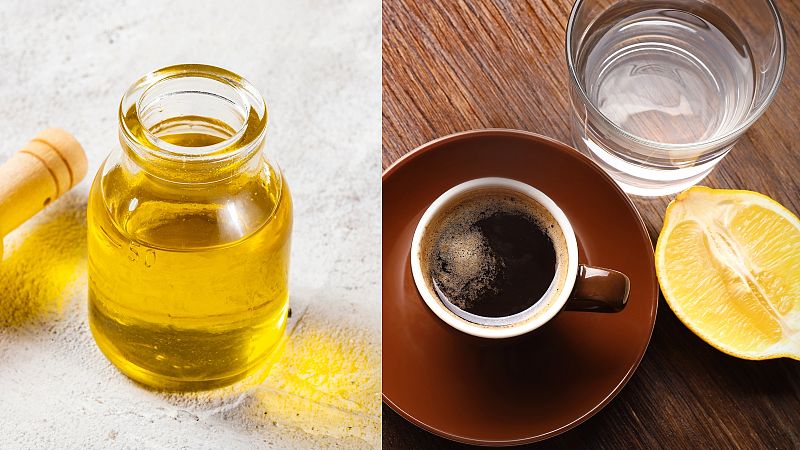
Users of the video-sharing platform TikTok share and consume a melting pot of content, including viral DIY videos claiming to offer low-budget beauty and wellness tips.
Among the shared and commented videos in these "do it yourself" trends are recipes or regimens on how to lose weight quickly without leaving the house; whether by making drinks with ingredients you have on hand in the kitchen, or slathering your skin with oil.
The castor oil application and coffee with lemon drink are two of the most popular trends shared so far on TikTok in 2025.
One post about castor oil alone has garnered 49,000 likes, meanwhile, the coffee with lemon trend, which started gaining popularity on the platform in 2024, remains one of TikTok's most popular weight loss trends this year, with individual posts reaching up to 25,900 likes.
But how do these popular tricks work, if at all? Euronews Health spoke with experts to break down these two viral weight loss trends.
Castor Oil
One of the more recent viral TikTok weight loss trends involves the application of castor oil on the stomach. Various TikTokers claim that rubbing the oil made from pressed castor beans on your belly daily can flatten the stomach in just a few weeks.
Priya Tew, Specialist Dietitian and director of Dietitian UK and media spokesperson for the British Dietetic Association explained that while applying castor oil to your stomach will not cause harm, it will not lead to significant weight loss either.
"There is no proof that this can reach your insides. So therefore what we're actually doing is moisturising our tummy. So if you would like a lovely moisturised tummy, then go ahead," she said.
According to Tew, it’s important to understand that not everything that you see on screen is the absolute truth.
"It's very easy to watch one of these videos and go, 'oh wow, look at that change that happened,’ and get sucked into it," she said. "But quite a lot of the time, these things are being faked".
Dr Adam Collins, professor of Nutrition at Surrey University, offers a similar point of view.
"Certainly [there is] no metabolic reason why that would affect the functioning of your subcutaneous and certainly is not going to affect your visceral fat," Collins told Euronews Health.
Coffee with lemon
Another viral TikTok weight loss trend involves adding lemon to coffee, with claims that the combination boosts metabolism and helps burn fat more effectively due to the caffeine.
However, adding lemon to coffee does not enhance a quick weight loss effect, according to Collins.
"It's not like all of a sudden you're going to be burning hundreds of calories more, or burning tens and hundreds of grams of fat," he said. "[...] unless you increase the dose of the caffeine quite high. But then that has other damaging effects".
"They're almost like using it inadvertently as like a meal replacement or a meal displacement... And that's what people who advocate don't care. They just want to sell it," he added.
While coffee can slightly increase metabolism and improve alertness, its impact can create a counterbalancing effect in food satiety according to Dr Christophe Matthys, professor of Human Nutrition at KU Leuven, head of Clinical Nutrition Unit, University Hospitals Leuven.
"If people start consuming a lot of caffeine, for example, they will have potential sleep deprivation," said Matthys. "There will be a hormonal reaction and a response that is kind of delaying your satiety level again, which is kind of stimulating you to eat more".
Impact of misleading claims
Social media trends can not only mislead someone to an improper weight loss diet but also influence users' relationship with food.
"People start having very strange relationships that are not necessarily related based on any physiology or immunology," said Matthys. "But more from a mental psychological point of view. Then it becomes very difficult to re-install a normal relationship with food, especially in young people".
Although tips and trends may seem to be easy fixes, the reality is that sustainable results require long-term commitment, Tew highlighted.
"Think about what are the small changes you can make that you can sustain. It could be adding an extra portion of fruit to your day, for example, or choosing to snack on some nuts instead of some crisps," she said.
"But it's these tiny little changes that actually, if you keep going with them, are going to make the difference".
Tew also reminded that body size is not always an indicator of health. "We can be healthy in all sizes, shapes, and bodies. So if you are in a large size body, it doesn't mean that you are unhealthy," she said.
"It doesn't necessarily mean that you do need to lose weight [...] you could be perfectly fine where you are," Tew added.







